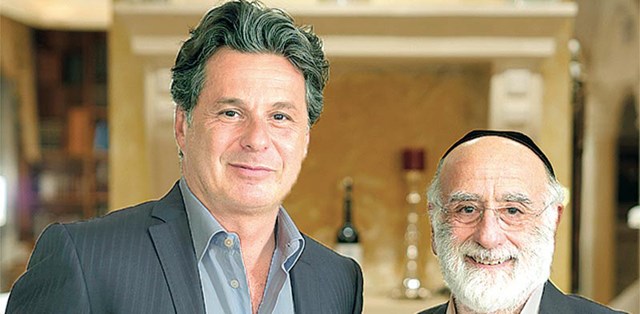Raphael and Fabrice Harari
Marketing of the drug developed at the Weizmann Institute is likely to begin in 2018.
The European Medicines Agency (EMA) Committee for Medicinal Products for Human Use (CHMP) has recommended by a majority of 29-2 the approval for marketing of the Tookad drug for treatment of prostate cancer developed by Israeli company Steba Biotech. Tookad is a complex treatment, in which the patient takes a drug, but the drug is activated only in the area of the tumor, through the skin. The product, developed by Professor Avigdor Scherz and Dr. Yoram Salomon of the Weizmann Institute of Science, has already been approved for marketing and sale in Israel and Mexico.
Steba Biotech was founded by Raphael Harari and his son, Fabrice Harari, Jews currently residing in Switzerland who founded European drug company Negma Laboratories and sold it for $250 million.
Among other reasons, Negma Laboratories was sold to finance Steba Biotech, which currently has dozens of employees, including 30 in Rehovot. Raphael Harari previously told “Globes” that he had invested hundreds of millions of dollars in the company.
Fabrice Harari told “Globes” today that the product will probably be granted final marketing approval in the coming months, and that the product would be launched in Europe in 2018.
“The first year or two of the launch will be on a small scale, because a treatment center has to be set up to train the doctors, and approval for the price of the product and insurance reimbursement must be obtained separately for each European country,” he said.
Fabrice Harari predicted that sales would pick up after two years. The drug is designed for use by prostate cancer patients whose tumors are small and are not developing rapidly. For this reason, surgery, which can have a negative impact on potency and urinary control, is contraindicated for them. The tumor’s development is monitored without treatment until treatment becomes unavoidable. Steba Biotech’s product is designed to facilitate less invasive treatment as a substitute for monitoring without treatment.
“Of the 400 patients in our trial, only 5% needed invasive treatment after our treatment, compared with 30% in the group that was only monitored (active surveillance),” Fabrice Harari declared. “Moreover, in 50% of the TOOKAD treated patients the disease did not progress compared to 22% only in the monitored group. Our treatment has certain short term side effects common to simple urologic interventions but they are isolated, compared with the long-term side effects including erectile dysfunction and incontinence observed at a significant rate in patients treated with radical approaches. In fact, at the 2 years after treatment, the experimental follow up duration, urinary and erectile function were found similar in the TOOKAD treated and monitored patients.”
Note that some of those monitored only reach invasive treatment too late when the disease reached the invasive T3 stage.
Fabrice Harari said, We will have to price the treatment so that it will be attractive to every insurer. Beyond that, we know that oncologists feel great discomfort with the existing active surveillance protocol, which in some cases requires them to monitor a patient whose disease has already reached the middle stage, without doing anything. We believe that every year, 50,000 people in Europe join the group of patients whose disease is at a stage in which they can profit from our treatment, which constitutes an interim solution.”
A meeting will soon take place between Steba Biotech and the US Food and Drug Administration (FDA) in order to consider registering the product for marketing in the US. “We very much hope that we will be allowed to register the product for marketing on the basis of the trial we conducted in Europe. What is the point of conducting another trial on a mostly Caucasian population just because it lives in another country, especially when the trial we conducted achieved such significant results?”, Fabrice Harari says.

